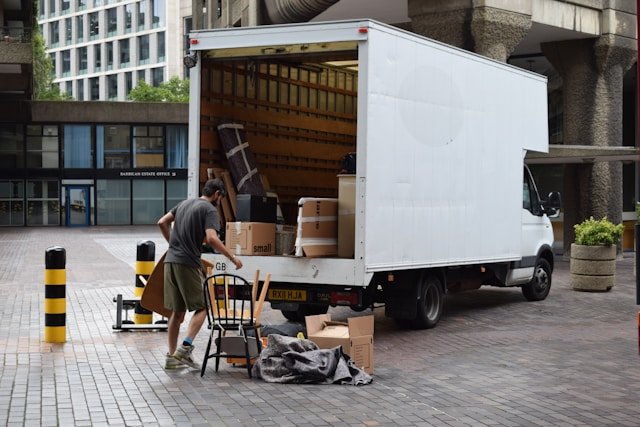
Your furniture is about to experience something most pieces never do: a genuine altitude adjustment. Denver sits at 5,280 feet above sea level, which creates unique conditions that affect everything from how wooden furniture behaves to how shipping trucks perform on their way up into the mountains.
Most people think about altitude adjustment for themselves when moving to Denver, but your furniture is going through its own adaptation process. Wood expands and contracts differently at altitude, leather responds to the dry air, and even electronic components in modern furniture can behave differently in the thinner atmosphere.
The good news is that expert shipping companies understand these altitude-related challenges because they deal with Denver deliveries regularly. They’ve developed specific techniques for protecting furniture during the elevation transition and know how to handle the climate considerations that make Denver different from sea-level destinations.
Your furniture shipment to Denver isn’t just about getting items from point A to point B, it’s about helping your belongings successfully transition to a completely different atmospheric environment while arriving in perfect condition.
The Altitude Effect Nobody Mentions
Denver’s elevation creates atmospheric conditions that affect furniture materials in ways that most people never consider until they’re dealing with cracked wood or dried-out leather a few weeks after moving.
Wood furniture experiences the most noticeable changes because lower air pressure and dramatically reduced humidity levels cause natural expansion and contraction patterns that differ from sea-level conditions. This isn’t damage, it’s adaptation, but it requires proper protection during the transition period.
Leather items often benefit from Denver’s dry climate because reduced humidity eliminates many moisture-related problems, but the same dryness can cause cracking or stiffening if leather isn’t properly conditioned before and after shipping.
Metal components in furniture, including hardware and decorative elements, can experience condensation issues during the altitude transition as items move through different climate zones before reaching Denver’s consistently dry environment.
Upholstered furniture sometimes reveals hidden moisture problems during the altitude adjustment because Denver’s dry air pulls moisture out of fabrics and cushioning materials that might have retained humidity from previous climates.
Climate Considerations That Matter
Denver’s high desert climate creates year-round dry conditions that affect furniture differently than the seasonal humidity variations most pieces experience in other regions.
Humidity levels in Denver average around 30%, which is significantly lower than most other major cities. This consistent dryness requires different protection strategies during shipping and can cause adjustment periods for furniture arriving from more humid climates.
Temperature variations between seasons are dramatic, with winter lows and summer highs that create expansion and contraction cycles for natural materials. Shipping companies time deliveries to minimize exposure to extreme temperature swings when possible.
UV radiation at Denver’s altitude is significantly stronger than at sea level, which affects furniture finishes and upholstery fabrics exposed to sunlight during loading, transport, or delivery. Professional shipping includes UV protection as standard practice.
Wind conditions throughout Colorado can affect transport schedules and require additional securing techniques for furniture loads traveling through mountain passes and open plains where wind speeds regularly exceed safe limits for high-profile vehicles.
Mountain Transport Logistics
Getting furniture to Denver involves navigating mountain terrain that creates logistical challenges different from flat-ground shipping routes used for most other major cities.
Elevation gain affects truck performance because engines work harder at altitude, fuel efficiency decreases, and cooling systems face additional stress during mountain climbs. Shipping companies factor these performance changes into route planning and scheduling.
Weather considerations include sudden mountain storms, seasonal road closures, and driving conditions that can change rapidly as trucks travel through different elevation zones on their way to Denver.
Route planning becomes more complex because alternative paths around weather or road conditions often involve significant detours through mountain passes or longer routes across plains that add time and fuel costs to deliveries.
Load securing requires additional attention because mountain driving involves grades and curves that create different stress patterns on furniture loads compared to highway driving across flatter terrain.
Seasonal Shipping Strategies
Denver’s distinct seasons create different advantages and challenges for furniture shipping depending on when your delivery is scheduled.
Winter shipping requires protection from snow, ice, and extreme cold that can affect certain furniture materials, but it also offers advantages like lower humidity that benefits some wood and fabric items during transport.
Spring weather provides mild temperatures and stable conditions, though mountain snowmelt can create transportation delays and requires flexible scheduling to accommodate changing road conditions.
Summer shipping benefits from predictable weather and clear mountain passes, but high altitude UV exposure and afternoon thunderstorms require additional protection and timing coordination.
Fall offers excellent shipping conditions with stable weather and comfortable temperatures, making it an ideal time for furniture deliveries that require careful climate consideration.
The Outdoor Lifestyle Impact
Denver’s outdoor culture influences furniture shipping in ways that don’t exist in other cities because people here prioritize different types of belongings and living arrangements.
Storage solutions become important because Denver residents often own outdoor gear, seasonal equipment, and recreational items that compete with traditional furniture for space in homes and apartments.
Furniture selection tends toward practical, durable pieces that complement active lifestyles rather than delicate items that require constant maintenance. This preference affects shipping strategies because Denver-bound furniture often emphasizes function over fragility.
Space utilization reflects the outdoor-focused culture, with many Denver residents preferring minimalist interior arrangements that leave room for gear storage and flexible living arrangements that accommodate outdoor equipment.
Quality expectations run high because Denver residents understand the value of well-made items that perform well in challenging conditions, whether that’s outdoor gear or furniture that needs to withstand altitude and climate variations.
Working with Denver Specialists
Choosing shipping companies with specific Denver experience provides advantages because altitude and climate considerations require local knowledge that general shipping companies might not possess.
Route expertise matters because mountain driving requires understanding weather patterns, seasonal road conditions, and alternative routes that keep furniture deliveries on schedule despite challenging terrain.
Climate protection experience ensures your furniture receives appropriate conditioning and protection during the altitude transition period that can affect materials sensitive to atmospheric changes.
Local partnerships with Denver-area services provide backup options for temporary storage, furniture conditioning, or repair services if altitude adjustment creates unexpected issues with specific pieces.
Insurance considerations should account for altitude-related adjustments that might affect furniture appearance or performance without representing actual damage requiring replacement or repair.
Preparing Your Furniture
Some furniture types benefit from specific preparation before shipping to Denver to minimize adjustment issues and ensure successful transitions to high-altitude conditions.
Wood furniture conditioning might involve gradual moisture adjustment before shipping to reduce the shock of sudden humidity changes during the altitude transition.
Leather treatment with appropriate conditioners helps prevent cracking or stiffening that can occur when leather items move from humid to dry climates rapidly.
Electronic component preparation includes ensuring connections are secure and components are properly sealed because altitude changes can affect electronic performance in unexpected ways.
Documentation of existing conditions becomes particularly important for altitude shipments because some changes during elevation adjustment might be normal adaptation rather than shipping damage.
Cost Factors Unique to Denver
Denver furniture shipping costs reflect the additional challenges and considerations involved in mountain transportation and altitude delivery rather than simple distance calculations.
Fuel costs increase for mountain driving because trucks work harder at altitude and consume more fuel during elevation changes, particularly when loaded with heavy furniture shipments.
Route limitations sometimes require longer paths around weather or seasonal road closures, adding distance and time to deliveries that affect overall shipping costs.
Specialized protection for altitude transitions requires materials and techniques that cost more than standard shipping protection but provide necessary safeguards for furniture making the elevation adjustment.
Insurance considerations for altitude-related adjustments might require additional coverage or specialized policies that account for the unique aspects of high-altitude delivery.
Making Denver Shipping Successful
Planning furniture shipments to Denver successfully requires understanding the city’s unique characteristics and preparing for environmental factors that don’t exist in other shipping destinations.
Timing considerations should account for weather patterns, seasonal road conditions, and the time needed for proper furniture conditioning before and after altitude transition.
Communication with shipping companies about specific furniture types and materials helps ensure appropriate protection and handling for items that might be sensitive to altitude or climate changes.
Flexibility in scheduling allows shipping companies to optimize delivery timing around weather conditions and ensures furniture arrives when environmental factors are most favorable for successful transitions.
Follow-up care after delivery might include monitoring furniture for normal altitude adjustment and providing appropriate conditioning to help items adapt successfully to Denver’s unique climate conditions.
Shipping furniture to Denver successfully means understanding that your belongings are making a genuine environmental transition that requires specialized knowledge and protection. The altitude and climate considerations are real factors that affect how furniture behaves and performs, but they’re also manageable challenges when you work with shipping professionals who understand Denver’s unique requirements and have developed the expertise to handle them appropriately.



